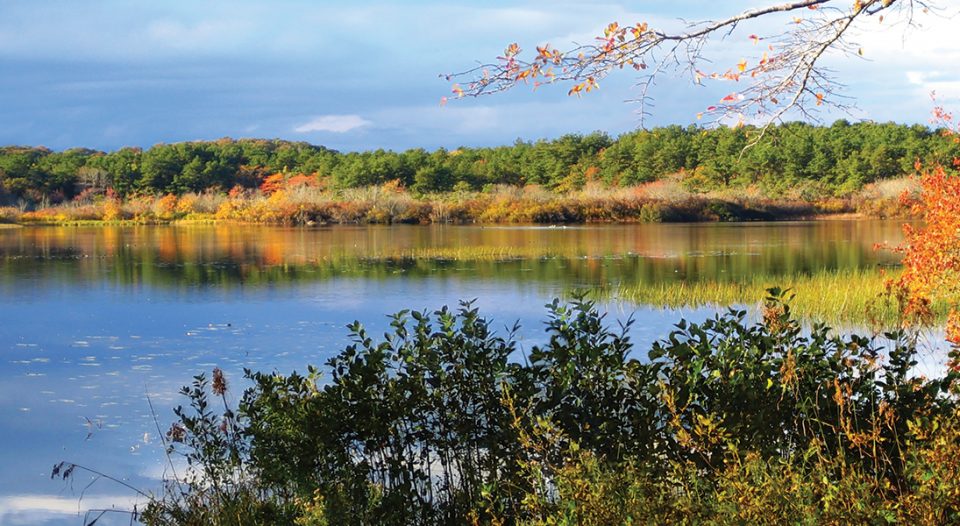How sometimes everything
closes up, a painted fan, landscapes and moments
flowing together until the sense of distance – – –
say, between Clapp’s Pond and me – – –
vanishes, edges slide together
like the feathers of a wing, everything
touches everything
(Mary Oliver, “Clapp’s Pond”).
This poem, found in Mary Oliver’s Pulitzer Prize-winning collection American Primitive, describes a miraculous togetherness of everything in our world. American Primitive is one of the first poetry collections I fell in love with, and it transformed the way I saw creation.
In all her work, Oliver reminds us of our place in creation. She wants us to remember that everything human, everything created by human beings, exists only within the context of a larger natural world. Through the splendor of her language and imagery, she invites us to open our eyes and see.
Oliver, of course, is not the only poet to have written about nature. From the earliest surviving poetry (from the 18th century before Christ) to Victorian Romanticism to contemporary ecopoetry, poets have often written about the natural world. If the goal of poetry is to dig deeply into the ineffable, there are no better subjects than the wind and the rain, the forest and the trees, the ocean.
As a poet, I often root my verse in the natural world. Every poem in my debut collection, Sermon Series, engages with creation in some way. During the two years I spent writing it, I wrestled with both my sense of vocation and a debilitating chronic illness. Through poetry, I could step outside of my struggles and better understand my place in God’s earth. Poetry taught me to engage my work and life through an ecocentric lens.
What is ecocentrism?
According to the Millennium Alliance for Humanity and the Biosphere, ecocentrism “finds inherent value in all of nature.”
When I shifted my consciousness toward ecocentrism, I recognized that I am both large and small, essential and insignificant. I understood how I fit into the world around me without being at its center. Ecocentrism reveals that humanity is just a piece of the whole, a tiny thread in the great web of every being, everything, all woven together across time and space.
Ecocentrism might also be a way for Lutherans to acknowledge God’s glory reflected in creation. “The Captain of our salvation, Jesus Christ, cares for the ark of this universe and its eternal destiny,” wrote H. Paul Santmire, a scholar and retired ELCA pastor. “He cares for every creature on board, in appropriate ways and, in turn, calls upon the human passengers of this universal vessel to care likewise for the whole vessel and all its creatures, in every appropriate way.”
As the living heart, hands and feet of Jesus, we are called not only to cherish God’s creation but also to respect and safeguard it.
Finding ecocentrism through poetry
As we approach Earth Day (April 22), when we pause to reflect on God’s wishes for creation, contemplative poetry can enhance spiritual practices. Poetry offers a gateway into the world around us, into the intricacies of hidden meaning to be found when we step away from our egos and contemplate what lies beyond.
I often find that a poet’s journey away from the self can provide much abundance. Take, for example, these lines from “The Peace of Wild Things” by Wendell Berry:
And I feel above me the day-blind stars
waiting with their light. For a time
I rest in the grace of the world,
and am free.
I think of the speaker staring up at the night sky, and I can’t help but recall similar experiences—watching the aurora borealis in Iceland or spending the night on Monarch Pass in Colorado. I, too, feel the warmth of this grace enfold me. I feel connected to the speaker, the poet, other readers. I feel connected to the same great sky, the same view
of the stars. I breathe freedom anew each time I read this.
Reading or even writing contemplative poetry can challenge us to think more critically about our impact on God’s creation. It also can give us peace and joy and a fresh perspective. Here’s one of my poems, called “I AM.”
I am
the wind
and the rain,
the greening earth, or
dried leaves crunching
underfoot.
I am
whole
and wholly broken,
cracked like ice
across the surface
of a stream
that keeps flowing
underneath.
I am
an echo,
the birth of the
universe.
I am
loving—
and also love—
unbound.
Learn more
The social statement “Caring for Creation: Vision, Hope and Justice” explains the ELCA’s teachings on ecology and the environment, teachings that are grounded in a biblical vision of God’s intention for the healing and wholeness of creation.




